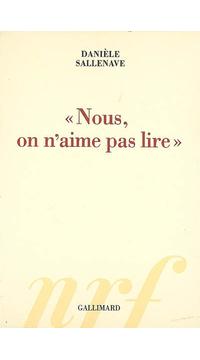
" Nous on n'aime pas lire "
Recital
Editions Gallimard
- Nominated for : The Literary Prize 2010
- Nominated for : The Literary Prize 2009
- Nominated for : The Literary Prize 2008
Born in 1940, Danièle Sallenave is a graduate of the "Normale" school and in Literature. Translator of Italian (La Divine Mimesis PP Pasolini, Le fou impur of Roberto Calasso ...) and teacher of literature at the University of Nanterre, she also worked at the newspaper Le Monde , the journal Le Messenger European and and Temps Modernes.
First a theorist, she founded the magazine Digraphe with John Ristat in 1974. Her works attempt to analyze the major issues of our time and denounce religious fanaticism and communalism: The drama of the modern world, far from being rational, is a mixture of high-tech and superstition. We have, at the same time, confidence in the technique and the need to be reassured of the ritual of the return to identity. (Dieu.com , 2003)
In order to fight against fundamentalism and communalism, she advocates culture. In Le Don des morts (1991), she praises reading as emancipated legacy of previous generations and Lettres mortes (1995), offers a high culture for all. Similarly, in 1997, she published A quoi sert la littérature? : to open a book,is to place oneself in a continuity, a story, to become a citizen of an ideal city and yet, not at all abstract, where the freedom of thought and writing, the freedom to judge, the game.
As a novelist, Danielle Sallenave follows at first a formal research (Paysages de ruines avec personages, 1975). Her novel Les Portes de Gubbio (1980 - Prix Renaudot) combines narration, letters, articles and citations in a reflection on art,the artist and freedom. She will resume this theme in Les trios minutes de diable (1994).
Her style then becomes more stripped and intimate but the memory and time are both central themes of her novel (Un printemps froid, 1983) all these novels (La vie fantome, 1986; Conversations conjugales, 1987; Adieu, 1988).
The author focuses on female figures with L'amazone du grand dieu (1997) which tells the fate of Marie Guyart, religious missionary or D'amour (2002) in which, "through the portraits of Pierre, Odette, her uncle, her father, her grandparents, Danièle Sallenave paints her self portrait. Absolutely moving." (Jean-Pierre Tison, Lire , May 2002)
Another woman's fate, that of La Fraga (2005 - Grand Prix Jean Giono), where a young American woman discovers, at the same time as Venice, her vocation as a painter and of freedom. In this apprentice novel, "Daniele Sallenave is at the best of her writing, with a sure line, a sensual look, a remarkable size of view, restores the stages of this existence at the same time clear and tormented." (Jean-Claude Lebrun, L'Humanité, May 12, 2005)
In 2005, the novelist was awarded the Grand Prize for Literature of the French Academy for her lifetime achievement and the following year, returns to the theater with Quand même (2006 - Awards Marguerite Duras), long monologue about beauty and the need for drama.
Castor de guerre (2008)" is not a biography. [...] It is a portrait, in which Beauvoir is facing herself and the history of the twentieth century ... If you do not know Simone de Beauvoir,she is discovered in her complexity, if one has read all of her she is happily found again, we see better how she chose herself [...] and why she wants to do "everything", at the same time write and live, see the world, be enchanted by beautiful scenery, smells, all the sensations." (Josyane Savigneau, Mondes des livres, 11 January 2008)
In her latest book, Danièle Sallenave continues reflection on topics close to her heart: teaching, the school institution, the French language and its teaching and bigotry of some theorists of the school. Nous on n'aime pas lire (January 2009) is a "story and [an] exciting analysis of the confrontation, during an operation in ZEP a generation of students who consider reading in its only utilitarian perspective and sees in culture a brand of superfluous. snobbery Let us not lose the secular dimension, the call for reading. If not it will be religion that retrieves this need ." (Alexis Brocas, Literary Magazine, February 2009)

